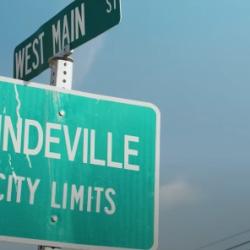Here’s a Steve Taylor song I’ve been listening to for 32 years now. Today I learned something new about it.
That’s “(We Don’t Need No) Color Code,” a raucous, righteous middle finger directed at Bob Jones University from Taylor’s 1984 Meltdown album. That album is a bit of a 1980s period piece now — synthesizers and keyboard guitars, mullet-perms … Lisa Whelchel — but at the time it seemed revolutionary and revelatory in the little world of the CCM industry, which was still developing, but already ossifying.
The early 1980s trappings also remind us how out of place a song like this was in Reagan-era white evangelicalism. The religious right was busily redefining the evangelical subculture as a partisan voting bloc, just starting to elevate the culture-war “social issues” that were transforming this religious tradition into a politicized machine for electing Republicans. And there’s plenty of that to be found on Meltdown, too.
But this was just one year after the Supreme Court’s ruling in Bob Jones University vs. United States. That case, which began working its way through the courts a decade earlier, was the “religious liberty” test case that provided the rallying point for the origins of the religious right — and thus for a religion that is now indistinguishable from the right. While many white evangelicals were still lamenting that decision as an example of evil Big Government persecuting Christians for standing up for their beliefs, Taylor’s manic song was condemning — and openly mocking — BJU for its bigotry, denouncing it in classic white evangelical fashion as “unbiblical.”
But here’s something I did not know about that song: The producer who recorded it for CCM-label Sparrow Records was a white supremacist.
Jonathan David Brown, who died in September of this year, was a veteran music producer for the CCM industry. As well as joining in the background chorus on the call-and-response in “Color Code,” Brown produced and played on albums for many of the leading Christian artists of the 1980s. He was also a member of the Tennessee White Knights of the Ku Klux Klan and eventually spent more than two years in federal prison for helping fellow Klan members evade law enforcement after they shot up a Jewish synagogue in Nashville.

I learned this from Jon Trott of the late, great Cornerstone magazine, who tells the full story in a recent post, “Evangelical Christianity and White Tribalism: The Strange Case of Jonathan David Brown.” It’s a long, weird read — a journey through what we think of as “fringe” ideologies and theologies that shows many of the points where they have intersected with, and influenced, what white evangelical Americans tend to think of as normal, “mainstream” theology and ideology.
“True believers won’t be snowed,” Steve Taylor sang. It’s a nice idea — that faith, the Bible, and good intentions are sufficient to protect us from being deceived by white supremacist theologies. But both the Bob Jones University case and the strange case of Jonathan David Brown remind us that these figures from the fringes are just permutations and offshoots of errors we’re still making and sins we have yet to repent of. We usually manage to recognize and repudiate such extreme examples, but that often reinforces a misplaced confidence that their faulty beliefs are far-removed from our own.
It’s comforting to think of someone like Brown as a “bad apple,” goggling at the absurdity of his anti-Semitic Anglo-Israelite ideology and treating the Klan he belonged to as a vestigial relic from some bygone era. But Brown’s warped theology wasn’t that many steps removed from the heresies and partisan tribalism that led Wheaton College to push out its only tenured black woman professor for pointing out that the Abrahamic religions all share the same God.
That happened this year. The tortured theological arguments against that professor share the same roots as the Reconstructionist and Dominionist ideologies and supercessionism that Brown took to extremes. And those arguments were also partly just a pretext for the primary reason that professor was forced out: She criticized Donald Trump — the Republican frontrunner and now the party’s nominee, for promoting and normalizing the hateful “alt-right” ideologies that attempt to mainstream the very same white-supremacist and anti-Semitic poison promoted by Brown in his KKK “Bible studies.” As Trump’s alt-right sympathies have become more prominent and more explicit, so has the defense of him by many “mainstream” white evangelicals — some of whom are now promoting anti-Semitic conspiracy theories of their own.
Jonathan David Brown was a member of the KKK and of a white supremacist cult, but that didn’t stop him from working for years for an evangelical record label. Larycia Hawkins is a black woman who criticized bigotry, and so she is no longer employed by an evangelical institution.
















